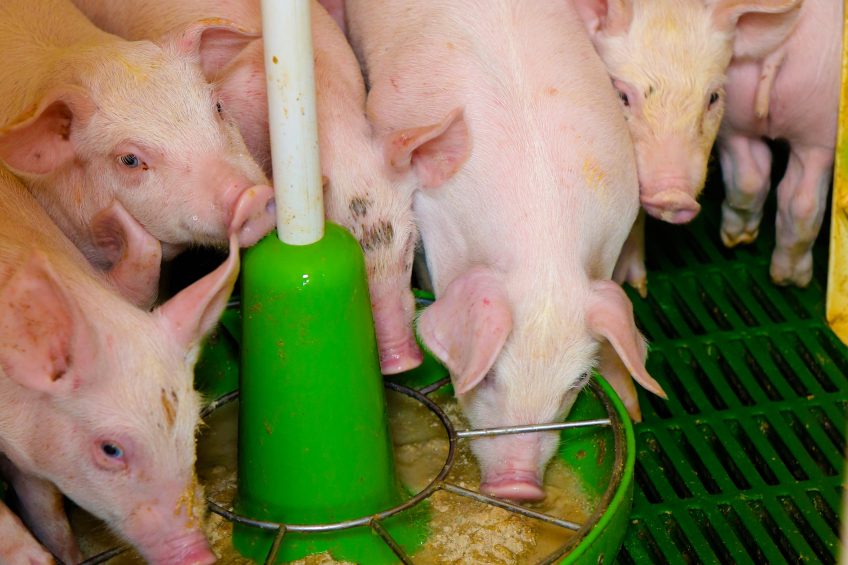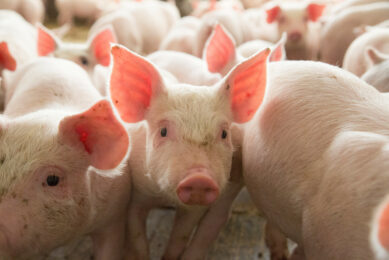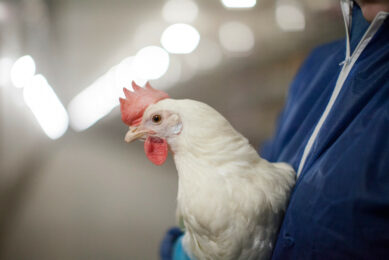Yeast-derived proteins promote health, performance

For just-weaned piglets, it is essential to receive protein sources that are highly digestible. Not every source is available everywhere, due to legislation restrictions. Yeast-derived protein does not have harmful side effects and is well-researched.
Young piglets need optimal nutrition to ensure good growth performance and to reach the required body weight at slaughter. Traditionally, highly digestible animal-derived proteins, such as plasma derived from blood, have been used in diet formulations to achieve this. However, there are now severe limitations and even bans on the use of these products in pig feeds in various countries.
Plant-derived proteins have been investigated as alternatives, but these can be associated with increased diarrhoea in piglets due to the various anti-nutritional factors they contain. Such factors include viscous oligosaccharides; lectins, which can attach to the gut wall and induce autoimmune reactions; and trypsin inhibitors, which limit protein digestion. For example, reports from trials where piglets have been fed soya protein isolates have shown an increased incidence of diarrhoea.
In need of high-quality protein
The pig industry needs a source of high-quality protein that does not cause harmful side effects in young animals. The product should be free of anti-nutritional factors and should have good palatability and digestibility and proven animal performance benefits. When transitioning from milk to cereal-based compound feed at weaning, piglets, like other young mammals, are at great risk of digestive disturbances.
They are also at a stage where protein deposition into muscle is rapid. This is the reason why weaning weights are commonly used as a gauge of final body weight at slaughter. Feeding during this time is especially important, as any gut-related problems can result in poor digestion and uptake of nutrients. In addition, any major diarrhoea incidents can cause damage to the gut and may retard the pig in its growth performance during the grower and finisher phases.
Figure 1 – Apparent and standardised digestibility of amino acids in piglets fed diets containing a yeast-derived protein source*, 20-30 days of age.
Nupro (Alltech, USA) is a protein source derived from yeast cell contents. It has a well-balanced amino acid profile and contains high percentages of inositol, glutamate and hydrolysed protein. The strategy is highly digestible, can be used as an alternative to fish meal and milk proteins and does not have the problems associated with plant protein derivatives.
In addition, the approach is rich in nucleotides, which play a wide range of physiological roles such as maintaining feed intake, as was demonstrated by Danish researcher Dr Hanne Maribo in 2000, attached to the Danish Pig Research Centre, which is currently part of SEGES. In addition, nucleotides have been shown to benefit young mammals in promoting the development of the digestive tract.
Nucleotides are especially beneficial to the cells lining the gut, preventing gut leakage via loose gut junctions at birth and weaning. Nucleotides include the purine and pyrimidine compounds that form the basic building blocks of DNA and are required for cell division and replication. These capabilities are important for repairing tissue damage and for maintenance of the gut lining. The cells lining the gut are exposed to factors such as feed passage, which sloughs off cells, and they are exposed to toxins from pathogenic bacterial activity. The immune system in young piglets is typically underdeveloped, and the important immune cells, lymphocytes and erythrocytes, are known to require nucleotides derived from feed to proliferate. This is especially true at birth and weaning, when the immune system undergoes major changes. Trials have shown increased gut wall thickness and maintenance of the lining in the presence of nucleotides. Trials in mammals have shown that adding nucleotides to feed for animals with damaged guts initiated healing within four days.
Inositol and glutamate
The yeast-derived protein contains other beneficial compounds, such as inositol (vitamin B8) and glutamate. Inositol is required for certain signalling pathways in the body, cell maintenance and repair, fat mobilisation and prostaglandin hormone production. Glutamate has an important role in energy supply in the gut, acts as a palatability enhancer and plays a major role in neurotransmission in the nervous system and brain. It influences secretory, immune and neuroendocrine functions in the intestine, increasing digestion efficiency and improving gut health.
Figure 2 – Impact of a yeast-derived protein source* on swine performance.

Using haptoglobin as a blood marker for assessing oxidative stress in piglets, trials have been conducted using the yeast-derived protein source at up to 3% in feed for 14 days post weaning and 1.5% for 15-28 days post weaning. Haptoglobin blood concentrations were reduced from 0.92 mg/ml to 0.46 mg/ml in the trial group.
Digestibility of protein in prestarter diets
Digestibility of protein in prestarter diets for piglets is important, as any undigested protein can flow to the hindgut, which damage the cell wall and inhibit water resorption, resulting in diarrhoea. Early trials, held in spring 2001, showed that feeding the yeast-derived protein source helped to decrease the incidence of diarrhoea, providing better digestibility as well as improved gut health and integrity of the lining. Trials comparing this protein source with plasma protein at 5% inclusion in feeds devised for 7- to 31-day-old piglets showed that replacing plasma with this protein source improved feed conversion ratio (FCR) by 7%. Other post-weaning trials comparing this yeast-derived protein source (2% in feed) against plasma protein supplementation showed that it significantly supported an increased growth rate of 40 g/day to 56 days after weaning at 28 days old.
Figure 1 shows a trial by a research team led by researchers Ron Ball and Soenke Moehn at the University of Alberta, Canada, held in 2009. It showed that Nupro digestibility in 20-30 day old piglets exceeded 80%, which was higher than a high-quality protein supplemented control diet. This was accompanied by an 8% increase in growth rate for piglets fed this yeast-derived protein source.
Eight-week trials
Another set of post-weaning studies was carried out over an eight-week period, where the yeast-derived protein source was included at 2.5% in the diet, conducted by Dr Hanne Maribo in 2003. This range of trials showed a 6.5% increase in feed intake and mortality was reduced to 1.4% compared to 4.8% for the fishmeal and whey formulated control (Table 1). Growth was significantly increased, by 23 g/day, for the piglets fed the yeast-derived protein source over the entire trial period.
Milk powder is often included in weaning diets, for a smoother transition from milk to compound feed based on cereal. A trial conducted by researchers Henman and Murphy in 2009 compared diets formulated with milk powder with and without the yeast-derived protein source addition at 4%. Piglets fed the protein source in non-milk-supplemented diets had 2.7 kg higher body weights (25.8 vs. 23.1 kg) with lower FCR (1.31 vs. 1.42).
Taking all the available data from 30 different studies into account, where piglets have been fed diets supplemented with the yeast-derived protein source, the average response was 3.9% increased growth rate, 3.1% lower FCR and 1% higher feed intake (see Figure 2). This would be expected to equate to up to an extra 4 kg body weight at slaughter, as demonstrated by Dr Paul Groenewegen, Alltech, in 2007.
Advantages for young piglets
Overall, supplementation of the yeast-derived protein source in feed offers many advantages to young piglets, not only as a highly digestible protein source but also as a specialist source of nucleotides needed to facilitate immune function and response and maintenance of the gut wall. The combined effect from the various compounds in this source enhances gut development, maintains gut integrity and promotes optimal gut microflora profiles, ensuring fewer digestive problems and diarrhoea episodes.
The yeast-derived protein source stimulates feed intake and nutrient utilisation at a time of high demand due to rapid weight gain. In terms of health, its individual compounds promote the development of the immune system and the proliferation of specialist immune cells. In production terms, this equates to another 4 kg of body weight at slaughter, four to five fewer days to attain slaughter weight and 5 kg less feed required, which all combine to improve profitability on-farm. Additionally, animals are healthier and their welfare is improved.












